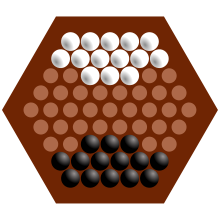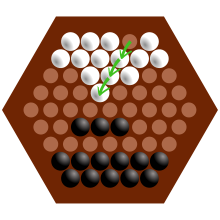Games/Abalone
Abalone

Abalone (board game) - Wikipedia - https://en.wikipedia.org/wiki/Abalone_%28board_game%29
"Abalone is an award winning two-player strategy board game designed by Michel Lalet and Laurent Lévi in which the players are represented by marbles of opposing colors. The objective is to push six of the opponent's marbles off the edge of the board."

Rules
Rules - http://marblescdn.cachefly.net/itemImages/instructions/Abalone_Rules.pdf
Game Play
"The board consists of 61 circular spaces arranged in a hexagon, five on a side. Each player has 14 marbles that rest in the spaces and are initially arranged as shown at left. Play alternates between the players one move at a time, with the black marbles moving first. For each move, a player moves a line of one, two or three marbles one space. The move can be either in-line (serial in respect to the line of marbles) or broadside (parallel to the line of marbles), as illustrated at right.
A player can push their opponent′s marbles which are in an adjacent space to their own with an in-line move only. They can only push if the pushing line has more marbles than the pushed line (three can push two or one; two can push one). Marbles must be pushed into an open space (i.e. not blocked by a marble of either colour) or off the board. The winner is the first player to push six of the opponent's marbles off of the edge of the board."
Movement

Broadside Move

Inline Move
Alternative Starting Positions

German daisy starting position

Belgian daisy starting position
Defensive Wedge

Black can defend forever
Strategy
Forums of Abalone communities have found that generally: [1]
- Keep the marbles close to the centre of the board and force the opponent to move to the edges.
- Keep the marbles close together for increased defense and attack, especially in a hexagon shape to be able to push or defend in any direction.
- Pushing the opponent off the board is not usually a good idea if it leads to weaknesses in the player’s geometry.
Rule variations
Abalone can be played by two people (or more) using the same board with fewer marbles, each in three different colours.
A number of two-player variations use a third colour for passive pieces, for example variation The Pillar (with a fixed marble in the centre of the board), which has been examined to some depth by Alex Borello and Nicolas Le Gal. Another possible variation involves either player winning the game by ejecting the central marble. A few variations use a second layer of marbles.
Marble Diameter
"Since no-one ever answered this question, the marbles in my set (1999 Abalone Games 2nd Edition) are exactly 22mm diameter. Nearest imperial size is 7/8" - in fact mine drop clean through a 7/8" aperture without touching the sides, but as marbles aren't made to that precision you'd never notice the difference I guess. " [2]
MoonMarble.com - Approx. 7/8" or 22mm - https://www.moonmarble.com/c-103-approx-78-or-22mm.aspx
What size marble do you want - http://glassmarbles.com/size.htm
Extra Players

Abalone Extra Player Marbles (Abalone Games Edition) | Board Game Version | BoardGameGeek - https://boardgamegeek.com/boardgameversion/32464/abalone-games-edition
Separately available | Abalone Extra Player Marbles | BoardGameGeek - https://boardgamegeek.com/thread/20731/separately-available
Publishers
Abalone - FoxMind - http://www.foxmind.com/games/1227-abalone